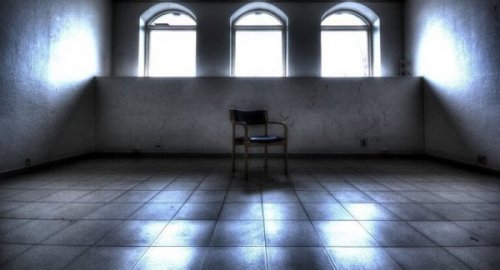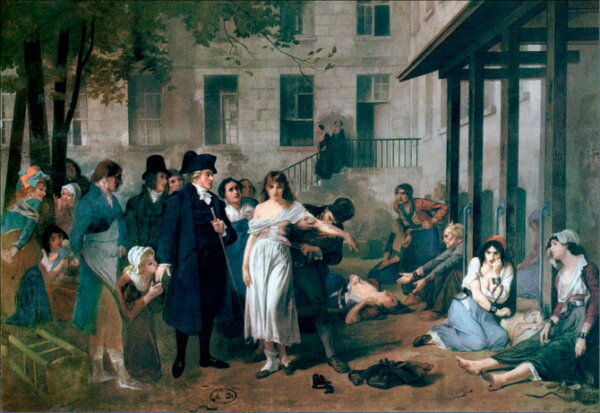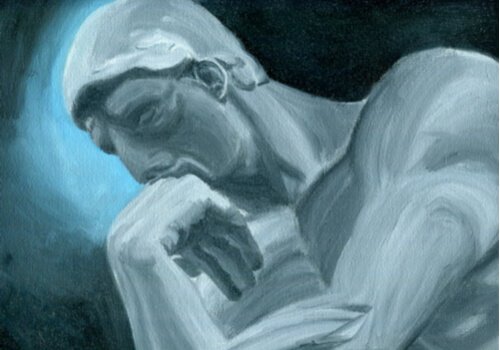Philippe Pinel is the “father of French psychiatry”. His major contribution to psychiatry was to depict the mentally ill as humans. He also proposed a novel categorization for mental illnesses, which lay the foundations for modern categorizations.
Pinel’s pragmatism and discipline were enough to focus on the mentally ill and prepare systematic notes. Consequently, these guided him towards clinical treatment and the classification of different mental illnesses.
“I can’t here avoid giving my most decided sufferage in favour of the moral qualities of maniacs. I have no where met, excepting in romances, with fonder husbands, more affectionate parents, more impassioned . . . than in the lunatic asylum, during their intervals of calmness and reason.”
-Philippe Pinel-
As a result of his work, mental institutions stopped the cruel treatment of mentally ill patients in France. He also presented several hypothesis on the cause of mental issues and highlighted the importance of comprehensive treatments.
A rough start for Philippe Pinel
Philippe Pinel was born in Jonquières, France, on April 25, 1745. He was the son of a physician who studied Medicine at Toulouse. He earned his degree in Medicine in 1773. Soon after, he went to Montpellier and familiarized himself with the ideas of Boissier de Sauvages and Barthez.
It wasn’t an easy start into medicine. To support himself, he wrote thesis dissertations for rich or lazy students. None of those dissertations explained anything new. In 1778, once he moved to Paris, he became a private math tutor and writer of medical articles.
A new beginning
During his first years in Paris, Philippe Pinel also translated several medical works. Among these, Cullen’s First Lines of Practice of Physic. At first, he didn’t see any patients. In 1786, he started treating some mental health patients at doctor Belhomme’s insane asylum.
Pinel’s main goal was to live a comfortable life. At first, he tried to collaborate with some medical institutions, but he wasn’t successful. He also tried to become a doctor to the Mesdames, the aunts of Louis XVI.
He sympathized with the French Revolution in 1789, but became less enthralled during the Terror. However, he became friends with Thouret, who helped him become a doctor at the Bicêtre Hospital. Pinel worked there from 1793 to 1975.

The new psychiatry
At the Bicêtre Hospital, a warden called Jean-Baptiste Pussin implemented some measures that Pinel found interesting.
Pussin treated patients with what was later called a moral treatment to patients. It was based on the idea that the patients still had some reason within and he worked on that to make them better. He also believed that the ill mustn’t be subjected to torture.
Pinel and Pussin became allies. The former requested permission to not chain the ill, which was customary at the time. At first, he didn’t succeed, but George Couthon listened. He was paraplegic, but he still managed to visit the hospice to handle Pinel’s requests.

Major changes
Philippe Pinel was named head of the Salpêtrière Hospital in 1795. There, he implemented similar measure to the ones in the Bicêtre Hospital. He didn’t allow patients to be chained and made several other improvements to improve the quality of psychiatric treatment.
He implemented a new psychological perspective in the treatment of mentally ill patients. His methods were the trailblazers for what ended up being known as individual psychotherapy. Before him, asylums worked as a prison. Likewise, he defined four basic mental illnesses: melancholia, mania (insanity), dementia, and idiotism.
In 1801, Pinel published Medico-Philosophical Treatise on Mental Alienation, a direct ancestor of psychiatric diagnosis instruments. He was decorated by Napoleon and those who came after him. Philippe Pinel died in Paris on October 25, 1826.
The Philosophy of Mental Illness
The post Philippe Pinel and the Beginnings of Psychiatry appeared first on Exploring your mind.



















Comments